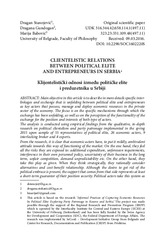Приказ основних података о документу
Clientelistic relations between political elite and entrepreneurs in Serbia
| dc.creator | Stanojević, Dragan | |
| dc.creator | Gundogan, Dragana | |
| dc.creator | Babović, Marija | |
| dc.date.accessioned | 2021-10-12T12:18:24Z | |
| dc.date.available | 2021-10-12T12:18:24Z | |
| dc.date.issued | 2016 | |
| dc.identifier.issn | 0038-0318 | |
| dc.identifier.uri | http://reff.f.bg.ac.rs/handle/123456789/2144 | |
| dc.description.abstract | Main objective in this article is to describe in more details specific interlinkages and exchange that is unfolding between political elite and entrepreneurs as key actors that possess, manage and deploy economic resources in the private sector of the economy. The focus is on the specific mechanisms through which the exchange has been unfolding, as well as on the perception of the functionality of the exchange for the position and interests of both type of actors. The analysis is conducted using empirical findings from the qualitative, in-depth research on political clientelism and party patronage implemented in the spring 2015 upon sample of 55 representatives of political elite, 26 economic actors, 9 interlocking broker and 8 experts. From the research, it is clear that economic actors have, to put it mildly, ambivalent attitude towards this way of functioning of the market. On the one hand, they feel all the risks they are exposed to: additional expenditure, unforeseen requirements, interference in their own personnel policy, uncertainty of their business in the long term, unfair competition, demand unpredictability etc. On the other hand, they take this play as given. When they think strategically, they rationally consider alternatives and cost-benefit relationship. Although the desire to get rid of the political embrace is present, the support that comes from that side represents at least a short-term guarantor of their position security. Political actors take this system as given to a certain extent and when describing the mechanisms of its functioning, they do not question the system itself. | en |
| dc.publisher | Sociološko udruženje Srbije i Crne Gore, Beograd i Univerzitet u Beogradu - Filozofski fakultet - Institut za sociološka istraživanja, Beograd | |
| dc.relation | Regional Research and Promotion Program (RRPP) | |
| dc.relation | Swiss Agency for Development and Cooperation (SDC), the Federal Department of Foreign Affairs | |
| dc.rights | openAccess | |
| dc.rights.uri | https://creativecommons.org/licenses/by-nc/4.0/ | |
| dc.source | Sociologija | |
| dc.subject | market | en |
| dc.subject | informality | en |
| dc.subject | Clientelism | en |
| dc.title | Clientelistic relations between political elite and entrepreneurs in Serbia | en |
| dc.type | article | |
| dc.rights.license | BY-NC | |
| dc.citation.epage | 238 | |
| dc.citation.issue | 2 | |
| dc.citation.other | 58(2): 220-238 | |
| dc.citation.rank | M24 | |
| dc.citation.spage | 220 | |
| dc.citation.volume | 58 | |
| dc.identifier.doi | 10.2298/SOC1602220S | |
| dc.identifier.fulltext | http://reff.f.bg.ac.rs/bitstream/id/927/2141.pdf | |
| dc.identifier.scopus | 2-s2.0-84973442073 | |
| dc.identifier.wos | 000379352200003 | |
| dc.type.version | publishedVersion |

